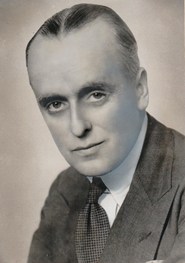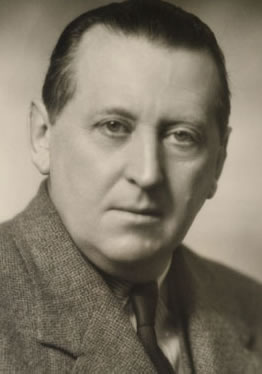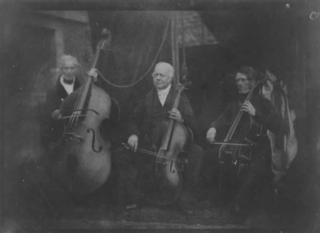Related Research Articles

Sir Henry Joseph Wood was an English conductor best known for his association with London's annual series of promenade concerts, known as the Proms. He conducted them for nearly half a century, introducing hundreds of new works to British audiences. After his death, the concerts were officially renamed in his honour as the "Henry Wood Promenade Concerts", although they continued to be generally referred to as "the Proms".

Sir Donald Francis Tovey was a British musical analyst, musicologist, writer on music, composer, conductor and pianist. He had been best known for his Essays in Musical Analysis and his editions of works by Bach and Beethoven, but since the 1990s his compositions have been recorded and performed with increasing frequency. The recordings have mostly been well received by reviewers.

Eric Francis Harrison Coates was an English composer of light music and, early in his career, a leading violist.

Joseph Charles Holbrooke, sometimes given as Josef Holbrooke, was an English composer, conductor, and pianist.

Sir George Alexander Macfarren was an English composer and musicologist.

William Henry Squire, ARCM was a British cellist, composer and music professor of the late 19th and early 20th centuries. He studied cello at the Royal College of Music, and became professor of cello at the Royal College and Guildhall schools of music.

Sir John Blackwood McEwen was a Scottish classical composer and educator. He was professor of harmony and composition at the Royal Academy of Music, London, from 1898 to 1924, and principal from 1924 to 1936. He was a prolific composer, but made few efforts to bring his music to the notice of the general public.

Edwin York Bowen was an English composer and pianist. Bowen's musical career spanned more than fifty years during which time he wrote over 160 works. As well as being a pianist and composer, Bowen was a talented conductor, organist, violist and horn player. Despite achieving considerable success during his lifetime, many of the composer's works remained unpublished and unperformed until after his death in 1961. Bowen's compositional style is widely considered ‘Romantic’ and his works are often characterized by their rich harmonic language.

Frederick Corder was an English composer and music teacher.
Adam Von Ahnen Carse was an English composer, academic, music writer and editor, remembered today for his studies on the history of instruments and the orchestra, and for his educational music. His collection of around 350 antique wind instruments is now in the Horniman Museum.

Charles Lucas was an English composer, cellist, conductor, publisher and from 1859 to 1866 third principal of the Royal Academy of Music.

Ebenezer Prout was an English musical theorist, writer, music teacher and composer, whose instruction, afterwards embodied in a series of standard works still used today, underpinned the work of many British classical musicians of succeeding generations.

Norman Houston O'Neill was an English composer and conductor of Irish background who specialised largely in works for the theatre.
Benjamin James Dale was an English composer and academic who had a long association with the Royal Academy of Music. Dale showed compositional talent from an early age and went on to write a small but notable corpus of works. His best-known composition is probably the large-scale Piano Sonata in D minor he started while still a student at the Royal Academy of Music, which communicates in a potent late romantic style. Christopher Foreman has proposed a comprehensive reassessment of Benjamin Dale's music. Dale married one of his students, the pianist and composer Kathleen Richards in 1921.

John Francis Barnett was an English composer, pianist and teacher.
Antoinette Kirkwood was an English composer born in London, with Irish family connections. She studied with Claud Biggs at the Irish Academy of Music and then piano and composition with Dorothy Howell and cello with Paul Tortelier at the Royal Academy of Music. She often accompanied her mother, the soprano Rome Lindsay. Radio Éireann broadcast her Symphony, op 8, composed in 1953. This "very notable achievement", said one unidentified reviewer, established that Kirkwood "can write a memorable tune in a definite key and can hold the listener’s interest for a considerable time". On 28 April 1960 the conductor Kathleen Merritt organized and conducted a Wigmore Hall concert of 'Contemporary British Women Composers', featuring the music of Kirkwood alongside Ina Boyle, Ruth Gipps, Dorothy Howell, Elizabeth Maconchy and Grace Williams.
Louise Emily (Emma) Lomax was an English composer and pianist. She was born in Brighton, daughter of the curator of Brighton Free Library and Museum. She attended the Brighton School of Music and then the Royal Academy of Music in London studying clarinet, and composition with Frederick Corder. She was a Goring Thomas Scholar from 1907 to 1910 and won the Charles Lucas Medal in 1910, awarded for her Theme and Variations for orchestra.
Mary Lucas, sometimes referred to as Mary Anderson Lucas, was an English composer and pianist.
Arthur Hinton was an English composer and conductor. His wife was the internationally famous pianist Katharine Goodson, who gave the first performance of his Piano Concerto in D minor in 1905.
Ethel Edith Bilsland was an English composer, soprano and pianist.
References
- ↑ RAM Club Magazine, No. 76, November 1926
- ↑ C.E.G. Peace. Descendants of Micah Corder, (2021), p. 3
- ↑ 'A New Life of Beethoven', in The Speaker, Vol. 2 (1890), pp. 389-90
- ↑ The Musical Times. Vol. 47, No. 758 (April 1, 1906), p. 271
- ↑ 'London Concerts', in The Musical Times, Vol. 47, No. 761 (July 1906), p. 488
- ↑ 'Royal Academy of Music', in The Musical Times, Vol. 48, No. 774 (August 1907), p. 541
- ↑ 'Royal Academy of Music', in The Musical Times, Vol. 49, No. 786 (August 1908), p. 532
- ↑ Monthly Musical Record, Volume 39 (1909), p. 185
- ↑ Landon Ronald (ed.). Who's Who in Music (1935), p. 236
- ↑ Who's Who, Volume 84 (1923), p. 698
- ↑ The Times, 29 October 1938, p. 10
- ↑ Sophie Fuller. Women Composers during the British Musical Renaissance, 1880-1918, King's College London thesis, p. 136
- ↑ 'London Concerts', in The Musical Times, Vol. 75, No. 1098 (August 1934), p. 746
- ↑ 'Society of Women Musicians', in The Musical Times, Vol. 91, No. 1293 (November 1950), p. 445
- ↑ Published by Bosworth